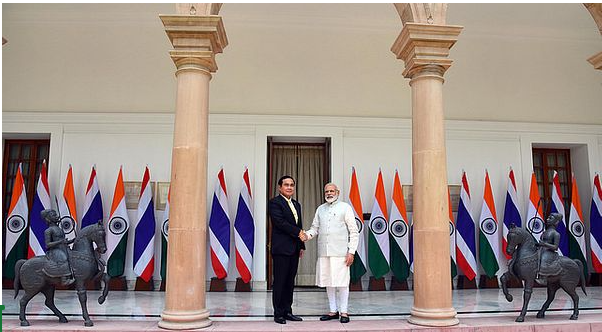Centuries of historical, cultural, and religious connections have knitted a strong bond between India and Thailand. These connections, which range from a common Buddhist past to similar inspirations in art, food, and customs, have strengthened the two countries’ special relationship. This bond serves as a crucial basis for their future cooperation as well as a tribute to their common history.
In the current worldwide economy, regional collaborations are essential for resolving issues and opening doors to expansion. To promote their shared goals, India and Thailand must make the most of their advantageous geographic positions, strong trade ties, and complementary industries.
Effective communication is essential to this effort as it guarantees the smooth flow of concepts, principles, and business plans. Knowing that language acts as a bridge across cultural nuances, Hindi translation services are essential to improving understanding and building closer ties between these two dynamic countries.
Shared History and Cultural Ties
The two countries’ interwoven past along historic trade routes promoted the flow of ideas and customs in addition to products, creating a rich culture of shared legacy. This legacy shows how important Buddhist cultural interactions were in developing spiritual and intellectual harmony and impacting both sides’ literature, art, and architecture. Here the linguistic connections highlight the historical cooperation that molded respect and understanding between the two cultures.
Economic Cooperation and Trade Relations
The relationship between both countries explores the dynamic economic partnerships that have emerged, focusing on trade agreements in different sectors like advanced technology, textile sectors, and agriculture. To collaborate effectively without any communication barrier, taking assistance from Hindi and Thai translation services is essential. This ensures clarity in business discussions and builds confidence in contracts. In addition to making business easier, these language services foster innovation and a smooth flow of ideas, strengthening economic bonds.
Travel: An Intercultural Bridge
Tourism is a potent instrument for increasing international relations because it promotes cultural interaction and reciprocal appreciation. Both Thailand and India, renowned for their diverse cultural legacies, have grown to be popular travel destinations for their respective populations. While Thai tourists appreciate India’s historical sites, spiritual retreats, and regional richness, Indian tourists are drawn to Thailand’s lively beaches, temples, and delectable cuisine.
These encounters are further enhanced by localized services, including expert translation services. Travel guides and menus that are accurately translated guarantee smooth communication and let visitors experience the local way of life on a deeper level. Additionally, companies in the tourism sector, including hotels and travel bureaus, can use translation services to customize their products for particular cultural
Regional Security and Strategic Alliances
To address common issues and promote stability, regional security, and strategic alliances are essential. In order to combat threats like terrorism, piracy, and human trafficking, India and Thailand actively cooperate on defense projects, cybersecurity, and intelligence sharing. With coordinated efforts in disaster response training and resource mobilization, their relationship goes beyond defense to address climate change and manage natural catastrophes.
These partnerships are based on accurate and transparent communication. Effective language solutions are essential for shared technical data, multilingual diplomatic discussions, and emergency operating instructions. By ensuring that important information is communicated accurately, translation and interpretation services reduce misunderstandings and promote confidence between parties.
Education and Academic Exchanges
Collaborations in education are essential for promoting global awareness and fortifying ties between individuals from different countries. Interaction programs develop cultural interaction in addition to academic development by bringing together instructors and students from other nations for learning opportunities. International student scholarships strengthen these linkages even further by giving people the chance to learn in other educational settings and broaden their worldviews.
These academic collaborations are based on language, which promotes efficient and transparent communication. Research paper translation promotes creativity and cross-border cooperation by enabling academics to communicate ground-breaking findings to a worldwide audience. When translated, lecture materials and academic resources guarantee accessibility and inclusivity for teachers and students from different linguistic backgrounds. Additionally, language assistance guarantees seamless communication and increases the effectiveness of cooperative endeavors like cooperative research projects or international academic conferences.
Digital Economy and E-Commerce Growth
With e-commerce serving as a vital link between worldwide marketplaces, the digital economy has emerged as a major force in international trade. Digital platforms have become crucial cross-border commerce facilitators in the context of Thailand and India. These platforms promote economic cooperation by facilitating smooth logistical management, simplifying transactions, and offering user-friendly interfaces. They increase trade opportunities and strengthen bilateral ties by enabling companies of all sizes to access new client bases.
Successful e-commerce is built on effective communication, and precise translations help companies get across language obstacles while providing customers with clarity and confidence. The likelihood of a purchase is increased when product descriptions are translated to ensure that prospective customers comprehend the characteristics, benefits, and specs of the product in their native tongue. By responding to questions or concerns in a way that is appropriate for the culture, localized customer service also improves the user experience and encourages repeat business. Furthermore, customized marketing efforts that are developed with an awareness of regional tastes and cultural intricacies greatly increase engagement, boost sales, and enhance a brand’s position in international markets.
E-commerce companies in Thailand and India may establish themselves as reputable participants in the global digital economy and promote growth and prosperity by incorporating trustworthy translation services into their operations.
Conclusion
A strong example of international cooperation may be seen in the long-standing India-Thailand partnership, which is based on centuries of shared history and cultural interaction. From academic cooperation and regional security to cultural exchanges and business ties, this vibrant partnership thrives on cross-sector engagement. To overcome linguistic barriers, and realize the full potential of bilateral relationships, professional translation services are essential. By facilitating smooth communication across several sectors, these services support tourism, corporate growth, inter-institutional academic cooperation, and regional security.














